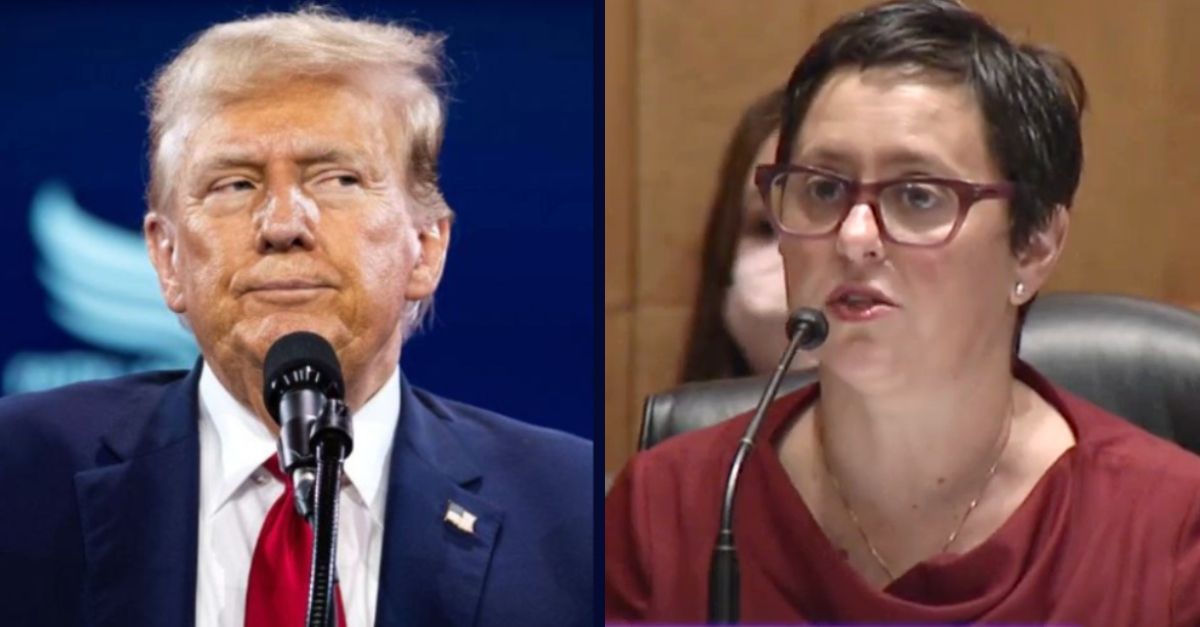Share this @internewscast.com

Left: Donald Trump delivers a speech at the annual Road to Majority conference in Washington, DC, in June 2024 (Allison Bailey/NurPhoto via AP). Right: Cathy Harris addresses a Senate HSGAC Committee nominations hearing on Sept. 21, 2021, as she seeks to become a member and chair of the Merit Systems Protection Board (Sen. James Lankford/YouTube).
An official of the Merit Systems Protection Board who was dismissed by President Donald Trump earlier this year has requested an appellate court to revisit its decision that supported her dismissal.
On Feb. 10, the 45th and 47th president attempted to dismiss Cathy Harris, appointed by Joe Biden, whose term is set to end in 2028, through an email from an aide, notifying her that she was “terminated, effective immediately.”
Harris sued in Washington, D.C., and days later won her job back through a temporary restraining order issued in February — and then a permanent injunction which was issued earlier this month — by U.S. District Judge Rudolph Contreras, a Barack Obama appointee.
On Friday, a three-judge panel on the U.S. Court of Appeals for the District of Columbia Circuit issued a 2-1 ruling in the government’s favor, staying the injunction. The ruling allows Trump to fire both Harris and National Labor Relations Board member Gwynne Wilcox — who had also won reprieve from a politically-motivated firing at the district court level.
Now, Harris is asking for the trio to give her another bite at the apple — and to allow her to hold onto her job in the interim.
“Harris requests the panel administratively stay its order granting the government’s motion pending Harris’s forthcoming petition to the en banc Court,” the motion for an emergency administrative stay reads. “If the special panel denies this motion for an administrative stay, Harris requests the en banc Court issue an administrative stay.”
The panel’s ruling conflicts with long-standing precedent.
Lately relied upon by numerous judges over firing disputes is a 1935 U.S. Supreme Court case keeping “quasi judicial and quasi legislative” agencies largely insulated from the whims of the president.
Relevant to Harris, that case controls the originating statute that created the MSPB, the Civil Service Reform Act of 1978 (CSRA). In tandem, the two sources of law have, for decades, been understood to mean that a president can fire a member of an independent agency “only for inefficiency, neglect of duty, or malfeasance in office.”
The two-judge majority disagreed.
“Humphrey’s has few, if any, applications today,” U.S. Circuit Judge Justin Walker, a Trump appointee wrote, referring to the 1935 case. U.S. Circuit Judge Karen L. Henderson, an appointee of George H.W. Bush, wrote a separate concurrence, while U.S. Circuit Judge Patricia Millett, a Barack Obama appointee, dissented.
Harris echoes the dissenting judge on the panel to accuse the majority of trying to rewrite Supreme Court precedent.
“The panel’s extraordinary order allows the Administration to immediately remove Harris from her position as a neutral arbitrator — something no President has attempted in the modern era — and mars the protection that Congress deemed essential for adjudicators to decide cases without fear or favor,” the motion continues. “The order effectively overturns Humphrey’s Executor and [another decades-old similar case]; defies the Supreme Court’s express instructions in [a recent similar case] that the Humphrey’s Executor framework remains good law; and ‘openly calls into question the constitutionality of dozens of federal statutes conditioning the removal of officials on multimember decision-making bodies.””
The plaintiff implores the full court to take up the issue — and stresses that she should be allowed to continue working meanwhile.
“Panels are ‘the agent of the court,’ and the en banc Court should not let this aberrational result stand,” the motion goes on. “The Court must ‘apply controlling precedent, not play jurisprudential weather forecasters.’ A brief administrative stay will preserve the status quo ante and prevent disruption, while the full Court quickly considers Harris’ forthcoming request to consider this matter.”

















